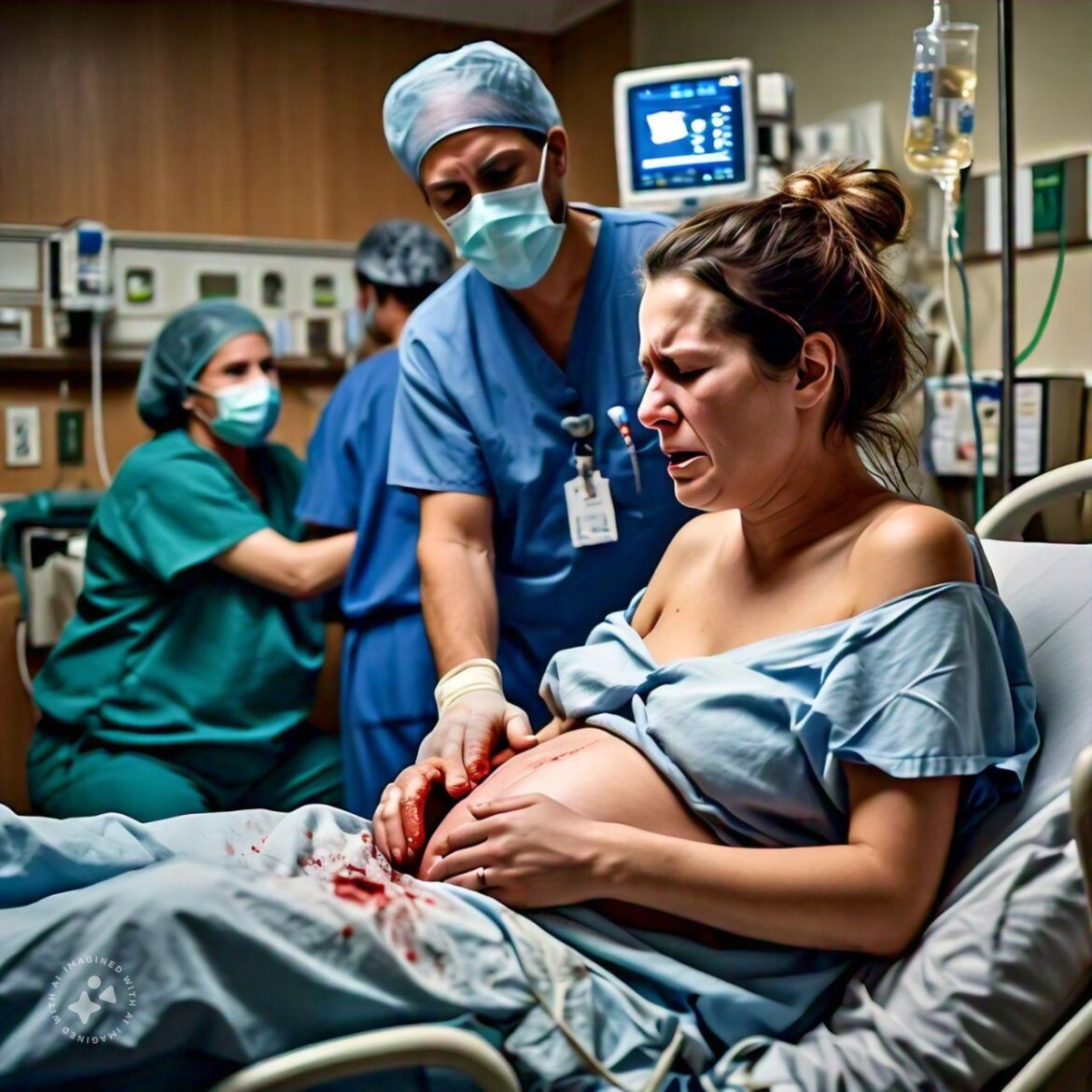The day my baby was born was one of the most joyful moments of my life but I also experienced the most common complication of childbirth. As I held my little one in my arms, I couldn’t shake off the feeling that something was off.
The excitement and elation of childbirth soon gave way to concern and fear as I began to experience unexpected bleeding.
What I didn’t know then was that I was facing the most common complication of childbirth – a condition that affects thousands of women every year.
In this article, I will share my personal experience with the most common complication of childbirth, and hope to raise awareness about the importance of being informed and prepared for any situation that may arise during childbirth.
The Most Common Complication of Childbirth
When joy suddenly turns into concern after giving birth, your life begins to change in a split second. The most common complication of childbirth can be unexpected and frightening, but with the right knowledge and support, women can navigate this challenge and come out stronger on the other side.
I guess you’re curious to know what it is right? Let’s get started.
My Experience with Postpartum Hemorrhage
I never thought I would experience the most common complication of childbirth: postpartum hemorrhage (PPH). But, just hours after delivering my baby, I found myself facing a terrifying reality. As I lay in my hospital bed, I began to feel a strange sensation – a sudden and intense bleeding that wouldn’t stop.
At first, I thought it was normal, but as the minutes ticked by and the bleeding only got worse, I knew something was wrong. Panic set in as I realized I was experiencing PPH, the most common complication of childbirth. I felt a wave of fear wash over me, mixed with a sense of disbelief.
Just hours before, I was holding my newborn in my arms, feeling elated and proud. Now, I was fighting for my own life. The symptoms were intense – heavy bleeding, clots, and a feeling of weakness that made it hard to move. But it was the emotions that followed that really shook me.
I went from feeling joyful and celebratory to concerned and scared. I felt like my body had betrayed me, and I was powerless to stop the bleeding. As I lay there, waiting for the medical team to intervene, I couldn’t help but think about the what-ifs. What if I didn’t make it? What if I left my baby without a mother?
The thoughts swirled in my head, making it hard to stay calm. However, as the medical team rushed in to help me, I knew I was in good hands. They quickly got the bleeding under control, and I began to feel a sense of relief wash over me.
I realized that, even in the midst of PPH, the most common complication of childbirth, there was hope. And, with the right care and support, I could overcome even the scariest of challenges.
Understand Postpartum Hemorrhage(PPH)
Postpartum hemorrhage (PPH) is the most common complication of childbirth, affecting millions of women worldwide. It is defined as excessive bleeding after childbirth, exceeding 500ml in the first 24 hours postpartum. PPH is a serious condition that can lead to maternal mortality and morbidity if left untreated.
The causes of PPH can be diverse, including:
Uterine atony: a condition where the uterus fails to contract properly after childbirth.
Trauma: injury to the genital tract during childbirth.
Blood clotting disorders: conditions that affect the blood’s ability to clot.
Retained placenta: a condition where the placenta is not fully expelled after childbirth.
The symptoms of PPH can be alarming and include:
- Heavy bleeding: soaking more than one pad per hour.
- Large clots: passing clots larger than a quarter.
- Pale skin: a sign of blood loss and shock.
- Rapid heartbeat: a sign of the body’s response to blood loss.
- Dizziness: a sign of low blood pressure.
It is essential to recognize the signs and symptoms of PPH, as prompt medical attention can significantly reduce the risk of complications. As the most common complication of childbirth, PPH demands attention and awareness to ensure the safety and well-being of new mothers.
Manage Postpartum Hemorrhage
After being diagnosed with PPH, my healthcare provider sprang into action to manage my condition. The first step was uterine massage, a technique that helps stimulate uterine contractions to reduce bleeding. My healthcare provider massaged my uterus to help it contract and reduce the bleeding.
In addition to uterine massage, I received medications to help control the bleeding. These medications included oxytocin and methylergometrine, which helped stimulate uterine contractions and reduce bleeding.
As my condition worsened, I required blood transfusions to replace lost blood and prevent shock. My healthcare provider closely monitored my vital signs and adjusted my treatment plan as needed.
Throughout the ordeal, my healthcare provider kept a close eye on my condition, monitoring my bleeding, blood pressure, and oxygen levels.
They adjusted my treatment plan accordingly, making sure I received the appropriate interventions to manage my PPH. Thanks to the swift and effective interventions of my healthcare provider, I began to stabilize and eventually recover from my PPH.
I was grateful for their expertise and care, which helped me navigate this frightening experience.
Emotional and Psychological Impact
Experiencing the most common complication of childbirth, PPH, took a significant toll on my emotional and psychological well-being. The fear of losing my life, anxiety about my baby’s well-being, and feelings of vulnerability overwhelmed me. I felt like my body had betrayed me, and I was powerless to stop the bleeding.
The emotional impact of PPH lingered long after the physical symptoms subsided. I struggled with anxiety, fearing another episode of bleeding, and felt vulnerable, like my body was no longer mine.
I became withdrawn, hesitant to share my experience with others, fearing they wouldn’t understand. However, with the support of loved ones and healthcare providers, I began to heal emotionally. My family and friends rallied around me, offering words of encouragement and help with my baby.
My healthcare provider reassured me, explaining that PPH was a common complication and that I was not alone. Sharing my story with others who experienced similar complications helped me feel less isolated. I realized that I was stronger than I thought, and that with support, I could overcome even the most daunting challenges.
The emotional scars of PPH still linger, but with time, support, and self-care, I have learned to cope and heal.
Lessons Learned
My experience with postpartum hemorrhage (PPH), the most common complication of childbirth, taught me valuable lessons that I will carry with me for the rest of my life. I learned that prioritizing my health and well-being is crucial, especially during the vulnerable postpartum period.
I realized that seeking immediate medical attention is essential if I experience any unusual symptoms, as prompt treatment can make all the difference in preventing severe complications. To other women who may face similar complications, I offer the following tips and advice:
- Trust your instincts and seek immediate medical attention if you experience heavy bleeding, clots, or other unusual symptoms.
- Prioritize your health and well-being, and don’t hesitate to ask for help when you need it.
- Surround yourself with a supportive network of loved ones and healthcare providers who can offer emotional and physical support.
- Remember that you are not alone, and that PPH is the most common complication of childbirth that many women have overcome.
With the lessons I learned, I hope to empower other women to prioritize their health and well-being, and to seek help when they need it.
In A Nutshell
My journey from joy to concern and back to joy was a transformative experience that taught me the importance of prioritizing my health and well-being. As I navigated the most common complication of childbirth, postpartum hemorrhage (PPH), I learned that even in the midst of fear and uncertainty, there is hope and resilience.
To all the women who have experienced or will experience PPH, the most common complication of childbirth, I offer my solidarity and support. Remember that you are not alone, and that seeking help is a sign of strength, not weakness.
Let us raise awareness about PPH, the most common complication of childbirth, and encourage women to prioritize their health and well-being. It’s important to break the silence and stigma surrounding this condition, and support each other through the ups and downs of motherhood.


